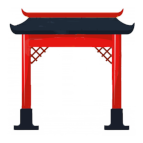| Meaning |

classic end-particle 矣
|
| Explanation |
|
Used in these characters:
|
|
唉
|
 |
|
JLPT HSK 5 |
|
| 'oh dear' or grunt/sigh of agreement, 'yes'
|
Left: mouth 口, right: end-particle 矣 (Ìf the nose 厶 is hit by an arrow 矢, it is the end.) [arrow 矢 = An arrow ノ in the sky 天]
The mouth gives at the end: the approval.

|
|
|
|
挨
|
 |
|
JLPT HSK 6 |
|
| adjacent, close to, to endure, in sequence
|
Left: Hand 扌, right: end-particle 矣 (If the nose 厶 is hit by an arrow 矢, it is the end.) [arrow 矢 = An arrow ノ in the sky 天]
It had (the distance) of a hand's width to the nose. This arrow was closely adjacent.

|
|
|
|
矣
|
 |
|
JLPT no HSK |
|
| classical final particle, similar to modern 了
|
Top: nose 厶, bottom: arrow 矢 (= An arrow ノ in the sky 天)
If the nose is hit by an arrow, it is the: end!

|
|
|
|
埃
|
 |
|
JLPT no HSK |
|
| dust, dirt, Ångström (=10^-10 m), Egypt
|
Left: earth 土, right: end-particle 矣 (If the nose 厶 is hit by the arrow 矢, it is the end) [here: 厶 as arrowhead]
The earth is hit by the head 厶 of the arrow and turns into: dust.

|
|
|
|
俟
|
 |
|
JLPT no HSK |
|
| until, wait for
|
Left: person 亻, right: end-particle 矣 (If the nose 厶 is hit by the arrow 矢, it is the end) [arrow 矢 = An arrow ノ in the sky 天]
When the person is at the end, it means: 'until ...'

|
|
|
| Radicals are shown here that are similar either in appearance or meaning. |  |
|
|
List of the characters |
List of the radicals
|

